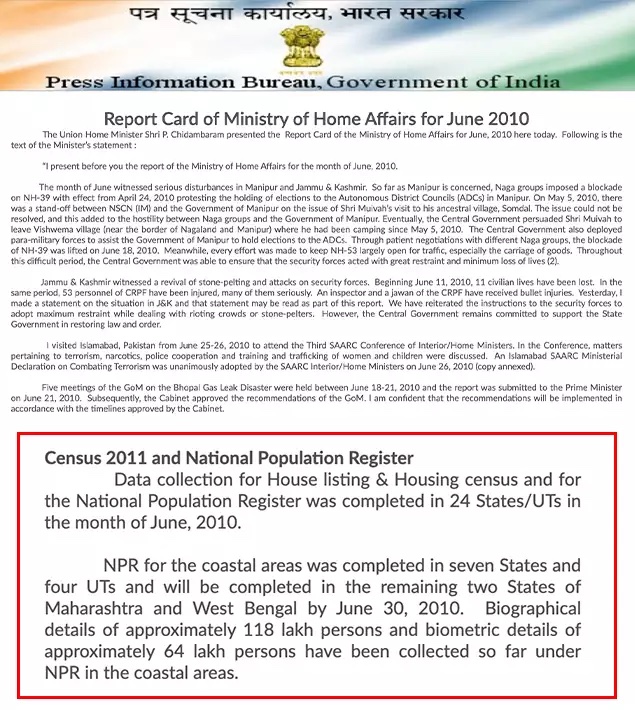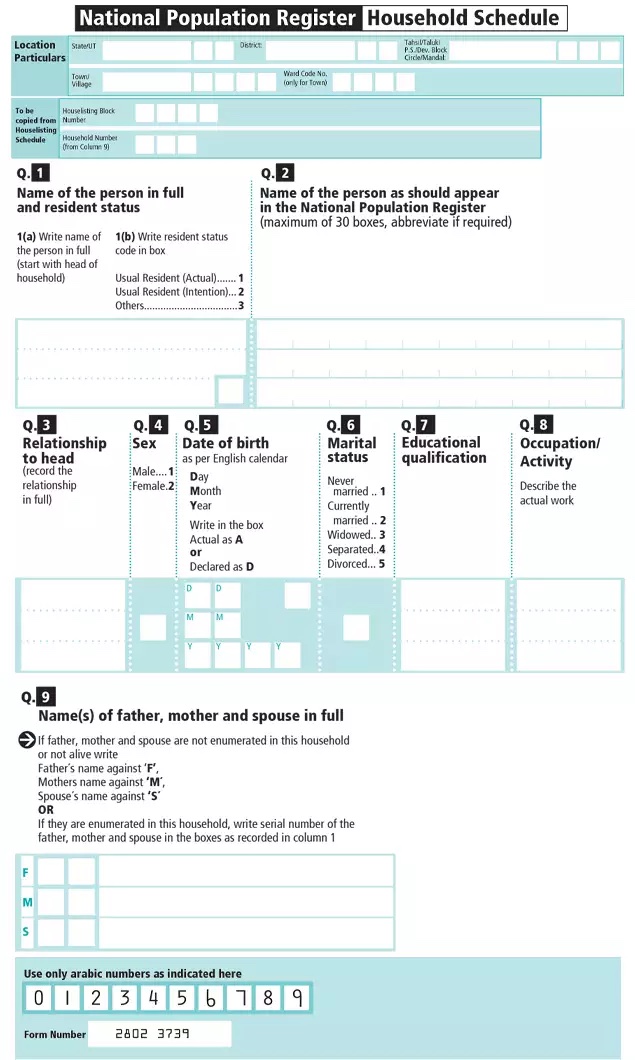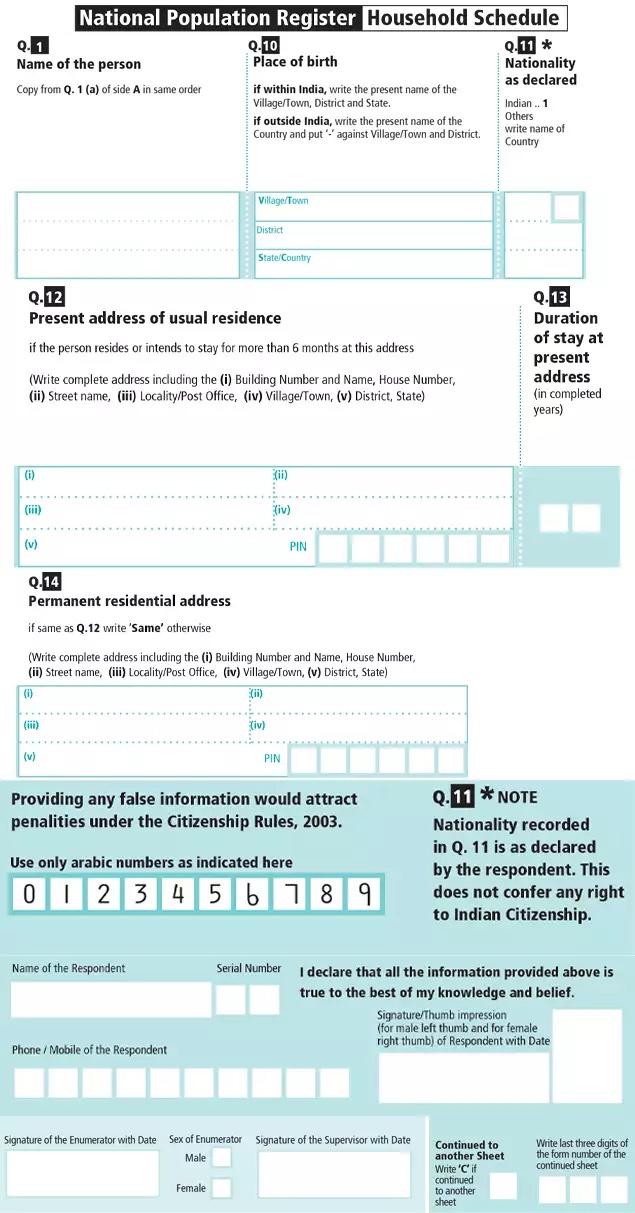National Population Register (NPR)
This is a collection of articles archived for the excellence of their content. |
Contents |
A backgrounder
As in 2019 Dec
1. What is NPR?
The National Population Register (NPR) is a register of usual residents of the country being prepared at the local (village/sub-town), sub-district, district, state and national level under provisions of the Citizenship Act 1955 and the Citizenship (Registration of Citizens and issue of National Identity Cards) Rules, 2003. It is mandatory for every usual resident of India to register in the NPR. Under the NPR, a usual resident is defined as a person who has resided in a local area for the past six months or more or a person who intends to reside in that area for the next six months or more.
'2. What is its purpose?’
NPR's purpose is to create a comprehensive identity database of every usual resident in the country. The database would contain demographic as well as biometric particulars. Aadhaar, mobile number, PAN, driving license, voter ID details and Indian passport numbers are among the details that will be collected from all usual residents of India. Sharing of Aadhaar is voluntary in view of the Supreme Court ruling in this regard.
3. What are the demographic details required?
Name of person Relationship to head of household, Father’s name, Mother’s name, Spouse’s name (if married), Sex, Date of Birth, Marital status, Place of birth, Nationality (as declared), Present address of usual residence, Duration of stay at present address, Permanent residential address, Occupation/Activity, Educational qualification.
4. What is the current status?
Data for NPR was collected in 2010 during collection of data for Census of India 2011. It was updated in 2015 through a door-to-door survey. The digitisation of the updated information has been completed. NPR data will now be updated along with the house-listing phase of Census 2021 from April-September 2020 in all states except Assam. A gazette notification to this effect has already been published by the central government.
'5. Which states have blocked NPR?’
The West Bengal government this month stayed all activities related to the preparation and updation of NPR. The decision came amid violent protests in parts of the state over CAA and chief minister Mamata Banerjee reiterating that the law and the proposed pan-India NRC will not be implemented in the state. Mamata Banerjee said, "All activities regarding the preparation and updation of the National Population Register are stayed in West Bengal. No activity regarding NRP may be taken up without clearance from the government of West Bengal." Kerala and Rajasthan have followed suit, saying they will not work on compiling the NPR as mandated by the Centre to record 'basic information' on citizens. "After considering the concerns raised in the wake of the 2019 amendment in the Citizenship Act, the state government has decided not to cooperate with the process to update the NPR to facilitate the preparation of the NRC," the office of Kerala Chief Minister Pinarayi Vijayan said in a statement last week.
6. Why is Assam excluded As of now, the NPR exercise is not being undertaken in Assam. Assam recently had the NRC exercise undertaken to identify and detain illegal immigrants. The purpose of a pan-India NRC it to detect illegal immigrants and detain them, irrespective of faith, however there are concerns it could arbitrarily exclude genuine Indian citizens.
7. How can NPR data be accessed
NPR data will not be put in the public domain but will remain a secure database accessible to the relevant user through password protected protocols. The government says it will use the data to enhance the targeting of beneficiary-oriented schemes and will have implications on improving internal security.
The origins of the NPR: Census report 2011
Dec 26, 2019 The Times of India

From: Dec 26, 2019 The Times of India
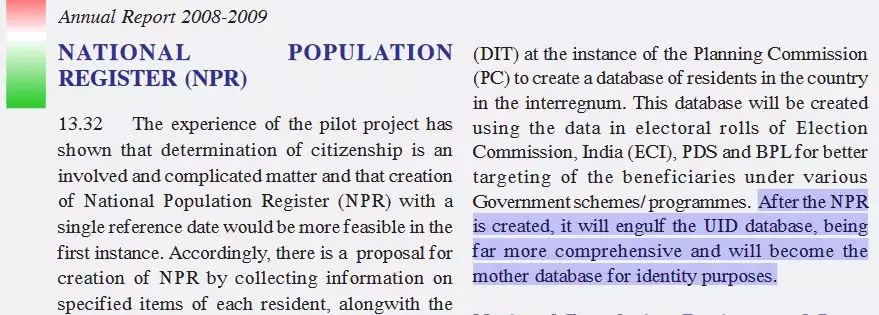
From: Dec 26, 2019 The Times of India
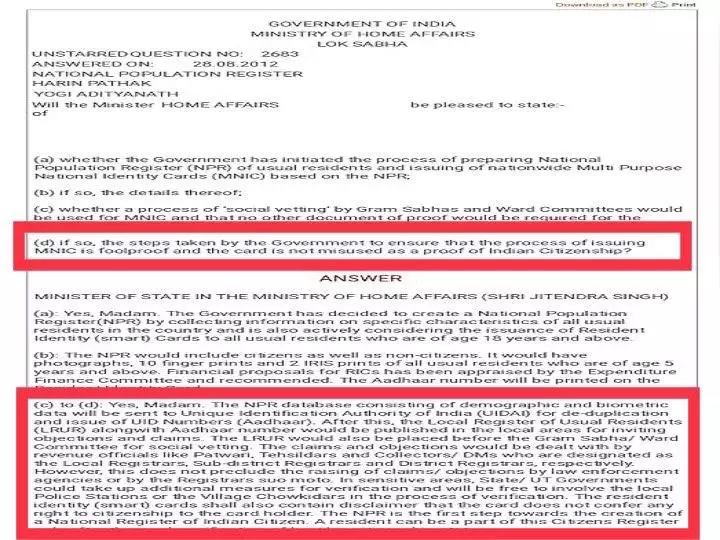
From: Dec 26, 2019 The Times of India
NEW DELHI: Amid nationwide protests over the controversial National Register of Citizens (NRC) and Citizenship Amendment Act (CAA), the opposition has relentlessly trained its guns on the Modi government.
They also claim the National Population Register (NPR) is a precursor to a pan-India National Register of Citizens, even as the Union Cabinet on December 24 approved funds for updating the NPR. Some opposition-ruled states such as West Bengal, Kerala and Rajasthan have even stopped work on the NPR in protest.
However a look at government documents readily available in the public domain show that plans for NRC and NPR were afoot during the UPA regime itself, an argument repeatedly put forward by the NDA govt in its defence. The 2011 Census report details the objective and procedure for NPR. The section on FAQs for NPR on the website of Registrar General and Census Commissioner of the MHA, defines the NPR as 'a register of usual residents of the country,' being prepared with the objective to 'create a comprehensive identity database with full identification and other details by registering each and every usual resident in the country.’
Further down, under Question no.5, the NPR is mentioned as 'the first step towards preparation of the NRIC,' and that it is compulsory for every citizen of the country to register.
Even before this, the MHA Annual report of 2008-09, when the UPA government was in power, clearly mentions that 'determination of citizenship is an involved and complicated matter and that creation of National Population Register (NPR) with a single reference date would be more feasible in the first instance.'
The section NATIONAL POPULATION REGISTER (NPR) on page 146 of the report further says that 'After the NPR is created, it will engulf the UID database, being far more comprehensive and will become the mother database for identity purposes.
In August 2012, in a written reply to a question raised by Yogi Adityanath (then an MP) in Lok Sabha, MoS Home Jitendra Singh (elected from Alwar, Rajasthan on a Congress ticket) shared details about the procedures to be adopted in the preparation of NPR and how local bodies will be involved.
A PIB release dated Dec 13, 2011 amply clarifies that detention camps in Assam are not a brainchild of the current dispensation, as is being claimed by some. It says that the government of Assam (then headed by Tarun Gogoi of the Congress) had set up three detention camps, at Goalpara, Kokrajhar and Silchar, to keep declared foreigners/illegal migrants till deportation to their place of origin.
2010: When Chidambaram was Home Minister
Kumar Shakti Shekhar, Dec 26, 2019 The Times of India
Press releases issued by Press Information Bureau (PIB) during UPA government and a study of the NPR form of 2010 indicate that the conditions were more stringent when Chidambaram was the home minister in comparison with the current situation.
Present home minister Amit Shah has gone on record to say the proposed NPR to be conducted by the Modi government is not linked to the National Register of Citizens (NRC) and that no biometrics would be collected from the residents. However, NPR 2010 referred to the collection of biometric data and details of Indian citizenship.
Chidambaram as home minister used to issue a monthly report card of his ministry at the end of the month. One of the report cards released in June 2010 quoted. Chidambaram as stating the following: “I present before you the report of the Ministry of Home Affairs for the month of June, 2010. Census 2011 and National Population Register. Data collection for house listing and housing census and for the National Population Register was completed in 24 States/UTs in the month of June, 2010.
“NPR for the coastal areas was completed in seven states and four UTs and will be completed in the remaining two states of Maharashtra and West Bengal by June 30, 2010. Biographical details of approximately 118 lakh persons and biometric details of approximately 64 lakh persons have been collected so far under NPR in the coastal areas.”
Further, the form for NPR 2010 sought to map the nationality of the residents. In all, there were 14 questions and question number 11 dealt with nationality.
It said “Nationality as declared, Indian or Others” and asked the resident to write the name of the country to which she or he belonged. The question also had an asterisk which stated that “Nationality recorded in Q. 11 is as declared by the respondent. This does not confer any right to Indian Citizenship”.
There will be ‘social vetting’ of NPR entries: UPA-2 had said
Bharti Jain, Dec 29, 2019 The Times of India
The UPA government, during its second term from 2009 to 2014, not only stated in Parliament that the National Population Register (NPR) is a prelude to the creation of a National Register of Indian Citizen (NRIC), but also said there will be “social vetting” of “usual resident status” as declared in the NPR.
In reply to a question in Lok Sabha on August 28, 2012, then minister of state for home Jitendra Singh had stated, “The National Population Register is the first step towards the creation of a National Register of Indian Citizens. A resident can be part of this Citizens Register only after thorough verification of her/ his citizenship status”.
A more interesting reply by Singh to a related query in Lok Sabha came earlier on August 2, 2011, where he detailed how entries in NPR would be subject to “social vetting” by gram sabhas and ward committees and claims and objections examined by revenue officials like patwari or talati, tehsildars and collectors. These officials are designated as local registrars, sub-district registrars and district registrars.
“....the Local Register of Usual Residents (LRUR) along with Aadhaar number would be published in the local areas for inviting objections and claims. The LRUR would also be placed before the gram sabha/ward committee for social vetting,” Singh, who then represented Alwar in Lok Sabha, had stated. He added that claims and objections may also be raised by law enforcement agencies or by the registrars on their own accord.
While referring to “social vetting” for NPR in reply to a Lok Sabha question on May 4, 2010, then MoS (home) Ajay Maken had confirmed that it had been discussed with all states and UTs, including at the chief minister level.
While NPR exercise was undertaken in 2010 followed by updation in 2015, the registry of usual residents was never published, ruling out any claims and objections. However, the data was shared with various central government agencies and state governments over time for formulation of targeted entitlement schemes.
